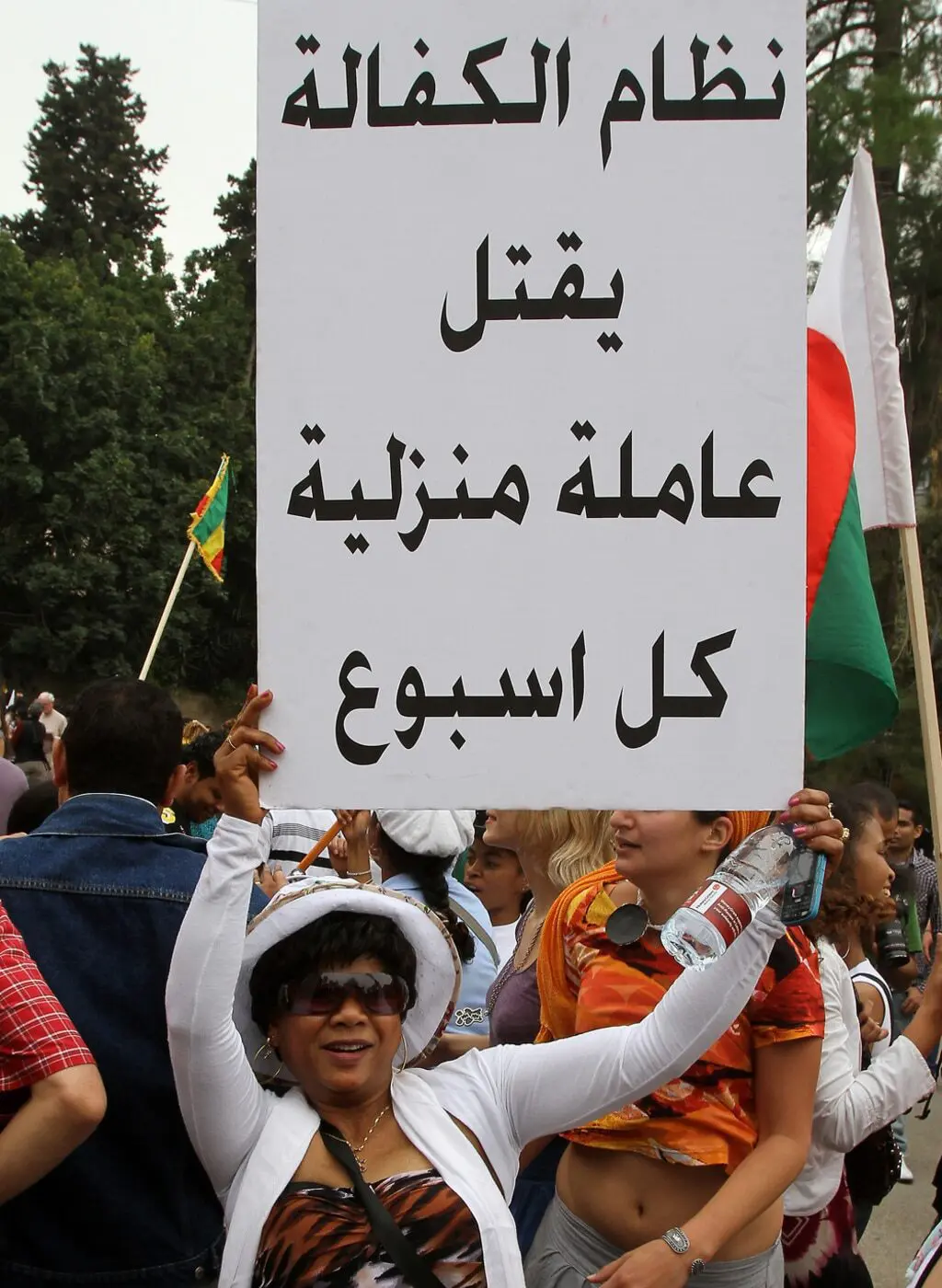
Migrant workers in Lebanon are employed under the kafala or sponsorship system, which binds a worker to one sponsor, usually his or her employer, who then has almost complete control over the worker. The most vulnerable migrants are domestic workers who come from Asia and Africa to work for Lebanese families.
One domestic worker dies every week in Lebanon from unnatural causes such as suicide, failed escape or murder, according to a report published by Human Rights Watch (HRW) in 2008. ‘Interviews with embassy officials and friends of domestic workers who committed suicide suggest that forced confinement, excessive work demands, employer abuse and financial pressures are key factors pushing these women to kill themselves or risk their lives,’ the report stated.
The judicial system appears unable to address these abuses, according to HRW. In a report titled Without Protection, HRW reviewed 114 Lebanese judicial decisions affecting migrant domestic workers. The report found that a ‘lack of accessible complaint mechanisms, lengthy judicial procedures and restrictive visa policies dissuade many workers from filing or pursuing complaints against their employers. Even when workers file complaints, the police and judicial authorities regularly fail to treat certain abuses against domestic workers as crimes.’
There is also the problem of papers, which not all migrant workers in Lebanon have, often after losing a sponsor. “If you don’t have papers, you are silenced,” Farah Salka, executive director of the local Anti-Racism Movement (ARM), told Fanack. “People can hit you and go free because you won’t go to the police, who will always ask for your papers, whatever your problem is.”
“There are an estimated 250,000 migrant domestic workers in Lebanon who live under an abusive kafala system and are excluded from Lebanon’s labour laws,” Bassam Khawaja, Lebanon and Kuwait Researcher for HRW, told Fanack. “Human rights groups routinely document reports of employers confiscating workers’ passports, delaying or not paying wages, refusing to provide time off or humane work hours, and verbal and physical abuse. Lebanon also restricts workers’ ability to have a family or children in Lebanon, and in recent years has deported workers who did so. Migrant domestic workers face legal obstacles in Lebanon’s judicial system when trying to seek accountability for abuses. These lawsuits can drag on for months or years, and judges rarely hold employers accountable for abuses, and hand down lenient penalties in the rare cases when they do.”
In the summer of 2016, the Lebanese authorities deported at least 21 domestic workers with children, saying that they were not living with their employer or were not supposed to give birth in Lebanon, according to a study published by the local association Insan in 2017. “Migrants and children’s vulnerable situation can be explained by the existence of a double deficit largely present in legislation and public policies of many states, including Lebanon, such as an absence of child-sensitive migration policies and practices, and the lack of migration-related issues in childhood policies that take into account the special needs and the vulnerable situation of migrant children and children affected by migration, among others,” Mariela Acuña, an Insan employee, told Fanack. “In this complex scenario, it is extremely important to develop a number of strategies that contribute to improving the situation of these children in order to ensure proper, universal protection of the rights of children in the context of international migration. In our experience, the situation for migrants and their children in particular has worsened over the years because several measures taken by the General Security have limited in an arbitrary manner the freedom and rights of migrant domestic workers. We, as civil society, reject and protest such arbitrary measures.”
In 2015, around 200 foreign female domestic workers launched the first domestic workers union in Lebanon, with the help of the National Federation of Trade Unions of Workers and Employees in Lebanon (FENASOL), an organization that has worked with foreign domestic workers for the past four years to lobby the government for improved rights. The Ministry of Labour has never answered the request, and in late 2016, Sujana Rana, a Nepalese domestic worker involved in the struggle was deported for activism.
“There’s an urgent need to adopt a new law that doesn’t bind the migrant domestic worker to the employer in a slavery-like relationship,” said Ghina al-Andary, an outreach and case worker at the local women’s association Kafa. “The law should be in accordance with the Domestic Workers Convention (C189) and provide migrant domestic workers with all the rights that other workers have.”
Without legal protection, according to al-Andary, “migrant workers are in general at risk of abuse since they are the powerless party in the employer-employee relationship”. She added: “The kafala system puts them at risk of abuse because of the power given to the sponsor, and the employment contract they sign doesn’t guarantee the protection of their rights. Above all, migrant domestic workers rarely have access to information about where they can seek legal assistance and what legal measures could be taken to protect them.”
She stressed that most migrant workers at risk are women. “Since domestic work is traditionally regarded as a ‘woman’s responsibility’, almost all workers hired for domestic work are women. Additionally, living on the same premises with the employers, many of them experience sexual harassment and physical abuse on a regular basis.”
In order to apply pressure, if not on the government then at least on abusive employers, the website This is Lebanon was launched on 1 May 2017 – International Labour Day – with the aim of naming and shaming those employers. It is a promising interim solution but much more needs to be done, according to Khawaja: “Lebanon should abolish the kafala system, include migrant domestic workers in the labour law protections and recognize the migrant domestic workers union.” Until that happens, many more migrant workers are likely to suffer in silence.


